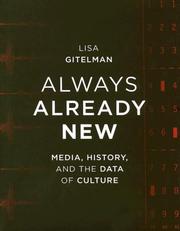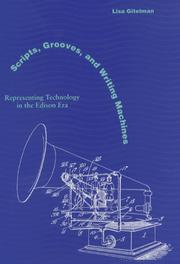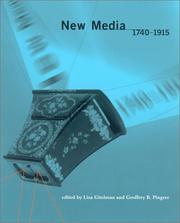| Listing 1 - 10 of 14 | << page >> |
Sort by
|
Book
ISBN: 9780822356455 9780822356578 0822356570 0822356457 9780822356578 0822356570 0822376768 1306539870 Year: 2014 Publisher: Durham, N.C. Duke University Press
Abstract | Keywords | Export | Availability | Bookmark
 Loading...
Loading...Choose an application
- Reference Manager
- EndNote
- RefWorks (Direct export to RefWorks)
Paper Knowledge is a remarkable book about the mundane: the library card, the promissory note, the movie ticket, the PDF (Portable Document Format). It is a media history of the document. Drawing examples from the 1870s, the 1930s, the 1960s, and today, Lisa Gitelman thinks across the media that the document form has come to inhabit over the last 150 years, including letterpress printing, typing and carbon paper, mimeograph, microfilm, offset printing, photocopying, and scanning. Whether examining late-nineteenth-century commercial, or "job" printing, or the Xerox machine and the role of reproduction in our understanding of the document, Gitelman reveals a keen eye for vernacular uses of technology. She tells nuanced, anecdote-filled stories of the waning of old technologies and the emergence of new. Along the way, she discusses documentary matters such as the relation between twentieth-century technological innovation and the management of paper, and the interdependence of computer programming and documentation. Paper Knowledge is destined to set a new agenda for media studies. Review: "In this thoroughly media archaeological book, Lisa Gitelman folds media history and discovers its edges by diving deep into the flatland of documents, reading technologies of duplication and dissemination from 19th century job printing to today's PDF. With implications for archival and information science, comparative media, digital humanities, and the history (and future) of texts, Paper Knowledge will be read, referenced, and reproduced - which is exactly what we want our documents to do." - Matthew Kirschenbaum, author of Mechanisms: New Media and the Forensic Imagination "Four intriguing essay make up this tantalising and ambitious short book. Each starts at a vivid point in the overlapping history of media and technology, and proceeds to meander around an ink-stained group of colourful characters and long-forgotten committees...Through these windows on the recent past, [Gitelman] subjects printing, copying, documents and paper to an analysis that is both fresh and grounded in the practices and prejudices of media studies [...] The strength of this bold volume is in its argument that we can learn a great deal if we focus, not only on what information they contain but what institutional and social function they serve; not what they're bound about but what they do." - Times Higher Education "Gitelman practices a kind of conceptual archeology without obeisance to the master, in an argument that stands well on its own... It's the first of the author's books I have read, but it won't be the last." - Inside Higher Ed
Documentation and information --- Communication and technology. --- Written communication --- Communication and culture. --- Authors and readers. --- Communication et technologie --- Communication écrite --- Communication et culture --- Ecrivains et lecteurs --- Social aspects. --- Aspect social --- cultuurfilosofie --- media --- mediakunde --- informatiewetenschap --- informatietheorie --- informatietechnologie --- informatiedesign --- pdf --- nieuwe media --- technologie --- reproductie --- boekdrukkunst --- papier --- communicatietheorie --- communicatie --- 007 --- 766.022 --- 130.2 --- mediatheorie --- Literacy --- Paper --- Papermaking --- Printing. --- Psychology --- Printing properties. --- History. --- Social Psychology. --- Communication écrite --- Authors and readers --- Communication and culture --- Communication and technology --- Written discourse --- Written language --- Communication --- Discourse analysis --- Language and languages --- Visual communication --- Technology and communication --- Technology --- Culture and communication --- Culture --- Readers and authors --- Authorship --- Social aspects --- anno 2010-2019 --- anno 2000-2009 --- anno 1800-1999 --- Documentaire informatie

ISBN: 9780262072717 0262072718 0262572478 9786612097942 1282097946 0262273896 1429477342 9780262273893 9781429477345 9781282097940 6612097949 Year: 2006 Publisher: Cambridge ; London MIT Press
Abstract | Keywords | Export | Availability | Bookmark
 Loading...
Loading...Choose an application
- Reference Manager
- EndNote
- RefWorks (Direct export to RefWorks)
An analysis of the ways that new media are experienced and studied as the subjects of history, using the examples of early recorded sound and digital networks.
Book
ISBN: 9780262518284 0262518287 9780262312325 0262312328 Year: 2013 Publisher: Cambridge (Mass.) : MIT press,
Abstract | Keywords | Export | Availability | Bookmark
 Loading...
Loading...Choose an application
- Reference Manager
- EndNote
- RefWorks (Direct export to RefWorks)
We live in the era of Big Data, with storage and transmission capacity measured not just in terabytes but in petabytes (where peta- denotes a quadrillion, or a thousand trillion). Data collection is constant and even insidious, with every click and every "like" stored somewhere for something. This book reminds us that data is anything but "raw, " that we shouldn't think of data as a natural resource but as a cultural one that needs to be generated, protected, and interpreted. The book's essays describe eight episodes in the history of data from the predigital to the digital. Together they address such issues as the ways that different kinds of data and different domains of inquiry are mutually defining; how data are variously "cooked" in the processes of their collection and use; and conflicts over what can -- or can't -- be "reduced" to data. Contributors discuss the intellectual history of data as a concept; describe early financial modeling and some unusual sources for astronomical data; discover the prehistory of the database in newspaper clippings and index cards; and consider contemporary "dataveillance" of our online habits as well as the complexity of scientific data curation
Information theory. --- Databases. --- Data transmission systems. --- Data warehousing. --- Théorie de l'information --- Bases de données --- Données --- Entrepôts de données (Informatique) --- Transmission --- Information warehousing --- Warehousing, Data --- Database management --- Management information systems --- Multidimensional databases --- Data communication systems --- Transmission of data --- Digital communications --- Electronic data processing --- Electronic systems --- Information theory --- Telecommunication systems --- Data banks --- Data bases --- Databanks --- Database systems --- Computer files --- Electronic information resources --- Communication theory --- Communication --- Cybernetics --- Théorie de l'information --- Bases de données --- Données --- Entrepôts de données (Informatique) --- Databases --- Data transmission systems --- Data warehousing

ISBN: 0804732701 0804738726 Year: 1999 Publisher: Stanford (Calif.) : Stanford university press,
Abstract | Keywords | Export | Availability | Bookmark
 Loading...
Loading...Choose an application
- Reference Manager
- EndNote
- RefWorks (Direct export to RefWorks)
An innovative and imaginative study of machines for writing and reading in late nineteenth century America, this book argues that these inscriptive technologies were materialized theories of language: that is, embodiments of the way people perceived writing and reading. Beginning with the promotion of shorthand alphabets, the author investigates varying inscriptive practices, from a surprising and complex genealogy of the phonograph, to new readings of the history of the typewriter and of the earliest silent films. Technological developments coincided with a new awareness of oral and inscribed communication which influenced the growth of consumer culture, literary and artistic experiences of modernity, and the definition of the 'human' sciences, such as linguistics, anthropology, and psychology. As a parallel with the present, this book will resonate with readers who are engaged daily with computer networks, hypertexts, and the forms that mass media will take in the new century.
003.5 --- 091:003.5 --- Communication and technology --- -Literacy --- -Illiteracy --- Education --- General education --- Technology and communication --- Technology --- Schrijfmaterialen --- Handschriftenkunde. Handschriftencatalogi-:-Schrijfmaterialen --- History --- Technological innovations --- -History --- Literacy --- History. --- -Schrijfmaterialen --- 091:003.5 Handschriftenkunde. Handschriftencatalogi-:-Schrijfmaterialen --- 003.5 Schrijfmaterialen --- -003.5 Schrijfmaterialen --- Illiteracy --- History of North America --- Mass communications --- Technological innovations&delete&
Book
ISBN: 0262312336 Year: 2013 Publisher: Cambridge, Massachusetts : The MIT Press,
Abstract | Keywords | Export | Availability | Bookmark
 Loading...
Loading...Choose an application
- Reference Manager
- EndNote
- RefWorks (Direct export to RefWorks)
We live in the era of Big Data, with storage and transmission capacity measured not just in terabytes but in petabytes (where peta- denotes a quadrillion, or a thousand trillion). Data collection is constant and even insidious, with every click and every "like" stored somewhere for something. This book reminds us that data is anything but "raw," that we shouldn't think of data as a natural resource but as a cultural one that needs to be generated, protected, and interpreted. The book's essays describe eight episodes in the history of data from the predigital to the digital. Together they address such issues as the ways that different kinds of data and different domains of inquiry are mutually defining; how data are variously "cooked" in the processes of their collection and use; and conflicts over what can -- or can't -- be "reduced" to data. Contributors discuss the intellectual history of data as a concept; describe early financial modeling and some unusual sources for astronomical data; discover the prehistory of the database in newspaper clippings and index cards; and consider contemporary "dataveillance" of our online habits as well as the complexity of scientific data curation. Essay authors:Geoffrey C. Bowker, Kevin R. Brine, Ellen Gruber Garvey, Lisa Gitelman, Steven J. Jackson, Virginia Jackson, Markus Krajewski, Mary Poovey, Rita Raley, David Ribes, Daniel Rosenberg, Matthew Stanley, Travis D. Williams.
Book
ISBN: 9780262572477 Year: 2008 Publisher: Cambridge MIT press
Abstract | Keywords | Export | Availability | Bookmark
 Loading...
Loading...Choose an application
- Reference Manager
- EndNote
- RefWorks (Direct export to RefWorks)

ISBN: 026227390X 0585481059 9780262273909 9780585481050 0262072459 9780262072458 Year: 2003 Publisher: Cambridge, Mass.
Abstract | Keywords | Export | Availability | Bookmark
 Loading...
Loading...Choose an application
- Reference Manager
- EndNote
- RefWorks (Direct export to RefWorks)
"Reminding us that all media were once new, this book challenges the notion that to study new media is to study exclusively today's new media. Examining a variety of media in their historic contexts, it explores those moments of transition when new media were not yet fully defined and their significance was still in flux. Examples range from familiar devices such as the telephone and phonograph to unfamiliar curiosities such as the physiognotrace and the zograscope. Moving beyond the story of technological innovation, the book considers emergent media as sites of ongoing cultural exchange. It considers how habits and structures of communication can frame a collective sense of public and private and how they inform our apprehensions of the "real.""--Jacket.
Mass media --- Communication & Mass Media --- Journalism & Communications --- History. --- History --- DIGITAL HUMANITIES & NEW MEDIA/New Media History --- SCIENCE, TECHNOLOGY & SOCIETY/History of Science --- Mass media and technology --- Technology and mass media --- Technology --- 791.5 --- achttiende eeuw --- communicatie --- cultuurgeschiedenis --- Edited by Lias Gitelman and Geoffrey B. Pingree --- filmgeschiedenis --- fotografie --- geschiedenis --- media --- negentiende eeuw --- nieuwe media --- stereoscopie --- telecommunicatie --- theorie --- twintigste eeuw --- virtual reality --- zograscoop --- 82:659.3 --- 82:659.3 Literatuur en massacommunicatie --- Literatuur en massacommunicatie
Digital

ISBN: 9781474416375 9781474416368 Year: 2022 Publisher: Edinburgh Edinburgh University Press
Abstract | Keywords | Export | Availability | Bookmark
 Loading...
Loading...Choose an application
- Reference Manager
- EndNote
- RefWorks (Direct export to RefWorks)
Multi

ISBN: 9780271082547 Year: 2021 Publisher: University Park, Pa Penn State University Press
Abstract | Keywords | Export | Availability | Bookmark
 Loading...
Loading...Choose an application
- Reference Manager
- EndNote
- RefWorks (Direct export to RefWorks)
Multi

ISBN: 9781479817474 Year: 2017 Publisher: New York, N.Y. New York University Press
Abstract | Keywords | Export | Availability | Bookmark
 Loading...
Loading...Choose an application
- Reference Manager
- EndNote
- RefWorks (Direct export to RefWorks)
| Listing 1 - 10 of 14 | << page >> |
Sort by
|

 Search
Search Feedback
Feedback About UniCat
About UniCat  Help
Help News
News